Guest
Guest
 |  Subject: As sanctions choke Iran, Hezbollah reportedly deploying for war on Israel border Subject: As sanctions choke Iran, Hezbollah reportedly deploying for war on Israel border  Sun Jul 21, 2019 10:13 am Sun Jul 21, 2019 10:13 am | |
| https://www.timesofisrael.com/as-sanctions-choke-iran-hezbollah-said-deploying-for-war-on-israels-border/As sanctions choke Iran, Hezbollah reportedly deploying for war on Israel borderLebanese terror group commanders say forces being sent to south for possible conflict, as pressure on Tehran growsBy [size=12]TOI STAFF and AGENCIES20 July 2019, 5:21 pm 5 [/size] 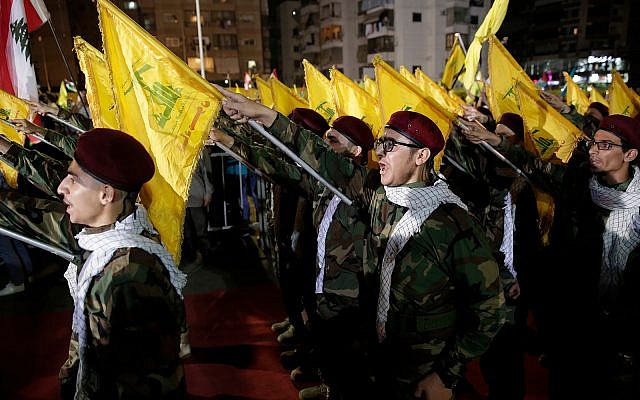
Hezbollah supporters take part in a rally to mark al-Quds day in Beirut, Lebanon, May 31, 2019. (AP Photo/Hassan Ammar)[size=18]As tensions rose in the Persian Gulf over the weekend with Iran’s seizure of a British-flagged tanker, several commanders of Lebanese terror group Hezbollah, an Iranian proxy, said they were deploying forces for possible war with Israel, warning that the growing pressure from sanctions on Tehran could trigger such a conflict sooner rather than later.
Officers in the organization told the Daily Beast in a report published Friday that its forces were setting up for war on both Lebanon’s and Syria’s border with Israel.
“We will fire the first shot this time,” said “Samir,” identified as a Hezbollah officer commanding 800 fighters on the border with Israel. He did not give his real name as he is not allowed to speak to the media. “The sanctions now have us preparing for dealing with the Israeli front,” he told the US publication.
The 2006 Second Lebanon War began after Hezbollah launched a surprise attack on an Israel Defense Forces patrol on the northern border in July that year, killing three Israeli soldiers and capturing the bodies of two of them.
Samir, a veteran of that war, spoke of the group’s greatly improved capabilities, as well as new weaponry targeting aircraft and naval vessels acquired in Syria and a more “seasoned” fighting force after years of battle in the country alongside forces loyal to President Bashar Assad.
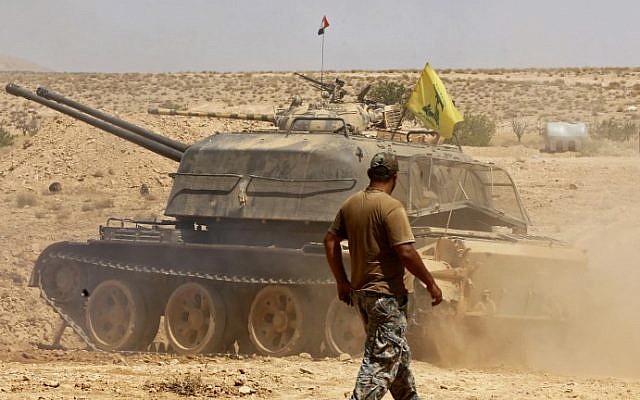
[size=12]Illustrative image of a tank flying the Hezbollah terror group’s flag seen in the Qara area in Syria’s Qalamoun region on August 28, 2017 (AFP Photo/Louai Beshara)Samir said Hezbollah had been wanting to open a new front with Israel but was held back by Assad.“Our wish before the war in Syria was to go and open a front in the Golan but [the Syrian Government] set a red line,” the commander said, describing the limits the Assad regime placed on Hezbollah’s operations in its territory. “Now there are no red lines.”Samir indicated that a new conflict with Israel would be “nothing like those that came before.” And he said Hezbollah could be deployed if Iran is pushed into a corner.“If any missile hits Iran, it will be treated like Israel did it,” he said.Samir said the punitive measures on Iran were being felt by the terror group as Tehran reduced financial support and salaries for Hezbollah fighters were cut.Another commander, “Assir,” noted that many Hezbollah fighters returning from the conflict in Syria were being sent to the Israeli border.“People who finish their mission in Syria go to the south,” he said. “There are some units in Syria but a lot go back to Lebanon or to the Golan. Thousands have come back.”A third commander who spoke to the Daily Beast, identified as “Ayman,” said that despite military readiness, there was a strong desire to avoid war as the devastation of the 2006 conflict is well remembered.The 34-day war saw thousands of rockets rain down on Israel’s northern region and claimed the lives 160 Israelis, most of them soldiers, and nearly 1,200 Lebanese, including several hundred Hezbollah fighters, according to the Israeli army.In the 13 years since that summer war, Israel has repeatedly accused Hezbollah of violating United Nations resolution 1701, which ended the war. In June, the head of the IDF Northern Command, Maj. Gen. Amir Baram, threatened overt and covert action against Hezbollah and Lebanon, in response to its efforts to build up terrorist infrastructure along the border.Hezbollah, Baram said, was “building infrastructure in the villages right here across [the border] and trying to threaten us with attack forces.”The Northern Command chief said that in a future war against the terror group the country of Lebanon was likely to “pay a heavy price” for allowing Hezbollah to take root there.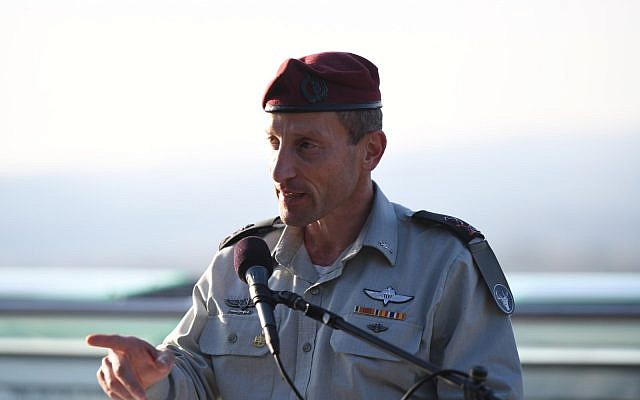
The head of IDF Northern Command, Amir Baram, speaks at a memorial ceremony for the 2006 Second Lebanon War, on June 11, 2019. (Israel Defense Forces)“Hezbollah’s loyalty was and remains to the supreme leader of Iran, not to the citizens of Lebanon. As a direct result of this, the nation of Lebanon will pay a heavy price in the next campaign for cooperating with Shiite terror,” Baram said, referring to the sect of Islam practiced by Hezbollah and Iran.Since the Syrian civil war began in 2011, the Israeli military has acknowledged carrying out hundreds of airstrikes in Syria on targets linked to Iran and Hezbollah.Israel has accused Iran of seeking to establish a military presence in Syria that could threaten Israeli security and attempting to transfer advanced weaponry to Hezbollah, which Jerusalem has vowed to prevent. Building tensionsTensions between Iran and the West have escalated in recent months amid a deepening standoff between the Islamic Republic and the United States over Tehran’s nuclear program, with a string of incidents involving tankers and drones.The latest involved Iran’s seizure of a British oil tanker in the strategic Strait of Hormuz which it said was in response to Britain’s role in impounding an Iranian supertanker two weeks earlier. At the same time, the country’s foreign minister insisted Iran was simply maintaining maritime law.Spokesman of Iran’s Guardian Council, Abbas Ali Kadkhodaei, was quoted on Saturday in the semi-official Fars news agency as saying “the rule of reciprocal action is well-known in international law” and that Iran’s moves to “confront the illegitimate economic war and seizure of oil tankers is an instance of this rule and is based on international rights.”The council rarely comments on state matters, but when it does it is seen as a reflection of the supreme leader Ayatollah Ali Khamenei’s views. The council works closely with Khamenei, who has final say on all state matters.Concurrently, Foreign Minister Mohammad Javad Zarif tweeted: “Unlike the piracy in the Strait of Gibraltar, our action in the Persian Gulf is to uphold int’l maritime rules.”The British-flagged and Swedish-owned Stena Impero tanker with 23 crew aboard was seized by Iran late Friday. Maritime trackers show it was headed to a port in Saudi Arabia.On July 4, Britain’s Royal Marines took part in the seizure of an Iranian oil tanker carrying more than 2 million barrels of Iranian crude oil by Gibraltar, a British overseas territory off the southern coast of Spain.Britain has said it would release the vessel if Iran could prove it was not breaching European Union sanctions on oil shipments to Syria. However, on Friday, a court in Gibraltar extended by 30 days the detention of the Panama-flagged Grace 1.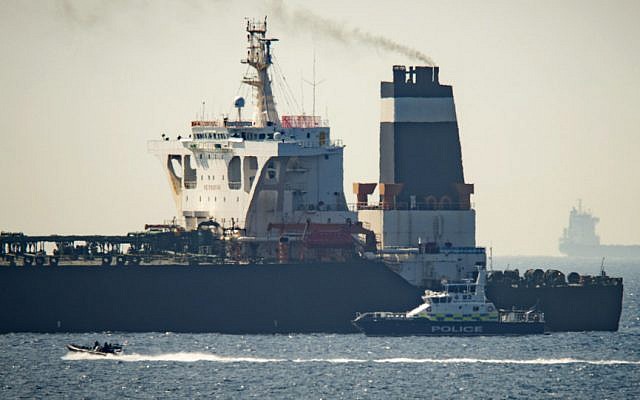
The Grace 1 super tanker in the British territory of Gibraltar, July 4, 2019. (AP Photo/Marcos Moreno)Iranian authorities had reported earlier Saturday that Iran had seized the British-flagged vessel late Friday after it rammed an Iranian fishing vessel — an explanation that portrayed the seizure as a technicality rather than a tit-for-tat move in the current tense climate.The Islamic Revolutionary Guard Corps said it seized the Stena Impero for breaking “international maritime rules” in the strait, a choke-point for around a third of the world’s sea-borne oil. The tanker was impounded off Bandar Abbas port for allegedly failing to respond to distress calls and turning off its transponder after colliding with a fishing vessel, authorities said.Britain initially said Iran had seized two ships in the Gulf, but the British owner of the Liberian-flagged Mesdar said it had been released after being temporarily boarded by armed personnel.Meanwhile, European powers urged Iran on Saturday to release the British-flagged tanker in what Britain called a “dangerous” move.British Foreign Secretary Jeremy Hunt said Friday’s incident showed “worrying signs Iran may be choosing a dangerous path of illegal and destabilizing behavior.”“Our reaction will be considered but robust. We have been trying to find a way to resolve the Grace 1 issue but WILL ensure the safety of our shipping,” said Hunt.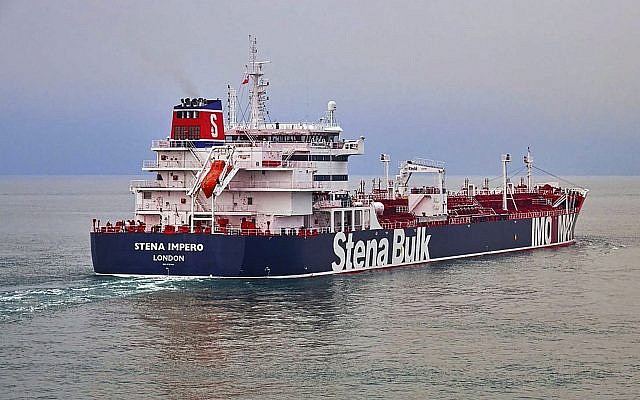
In this undated photo issued July 19, 2019, by Stena Bulk, showing the British oil tanker Stena Impero at unknown location, which is believed to have been captured by Iran. (Stena Bulk via AP)Hunt warned that “if this situation is not resolved quickly there will be serious consequences.”But, he told Sky News, “we’re not looking at military options, we are looking at a diplomatic way to resolve the situation.”The British government advised British ships to avoid the Strait of Hormuz for “an interim period.”“We remain deeply concerned about Iran’s unacceptable actions, which represent a clear challenge to international freedom of navigation,” a spokeswoman said after an overnight meeting of Britain’s COBRA emergencies committee.Germany and France also urged Iran to release the tanker, whose seizure Berlin called a “dangerous further aggravation of an already tense situation.”The Guards said Thursday they had seized another “foreign tanker” and its crew days earlier for allegedly smuggling fuel, without giving further details.Trump said Friday’s incident “only goes to show what I’m saying about Iran: trouble. Nothing but trouble.”The Stena Impero had been heading for Saudi Arabia on Friday when it hit a fishing vessel, according to port authorities at Bandar Abbas, off which the tanker is now anchored. Allah-Morad Afifipoor, director-general of the Hormozgan province port and maritime authority, said experts would investigate the incident.The tanker “has 23 crew and they are all on the ship,” he said, quoted by the Fars news agency.The Philippines said 18 Indians, three Russians, a Latvian and a Filipino were aboard. Both Manila and New Delhi said they had contacted Tehran to seek their nationals’ release.Afifipoor said the fishermen had issued a distress call after the collision, contacting the port authority when they “didn’t receive any response.”“One of the reasons the British tanker was seized for further investigation was that for a period of time it was moving on its route with its transponder turned off,” he told ILNA news agency.Tracking service MarineTraffic showed the Stena Impero had last signaled its location near the island of Larak at 9:00 p.m. (1630 GMT).Its owner said the ship was transiting the Strait and was in “international waters” when it was “attacked by unidentified small crafts and a helicopter.”The incident came as US President Donald Trump and American officials insisted, despite denials from Tehran, that the US military had downed an Iranian drone that was threatening an American naval vessel in the Strait.Trump said the drone had been threatening amphibious assault ship the USS Boxer.The Revolutionary Guards released video footage they said disproved the US claims.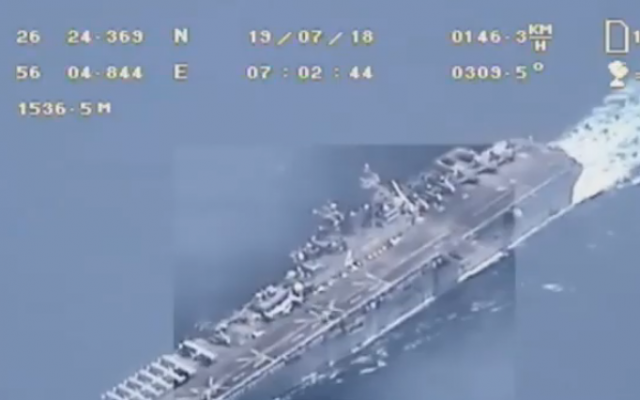
Footage Iran says was taken by one of its drones after the US claimed to have brought it down in the Strait of Hormuz, July 19, 2019 (video screenshot)The seven-minute video, apparently shot from high altitude, shows a convoy of ships the Guards said they were tracking as they passed through the Strait. The vessels could not be immediately identified, although one resembles the USS Boxer.As tensions soared, Iran’s arch-rival Saudi Arabia said it would once again host US troops to boost regional security.The Pentagon said the deployment “ensures our ability to defend our forces and interests in the region from emergent, credible threats.”The US military also said its patrol aircraft were monitoring the Strait, and announced a “multinational maritime effort” to ensure freedom of navigation in key waterways.The escalation comes more than a year after Washington unilaterally withdrew from the 2015 Iran nuclear agreement and began ratcheting up sanctions against Tehran.Earlier this month, Iran exceeded the deal’s caps on uranium enrichment, aiming to pressure the remaining parties to make good on promises to help prop up its economy.Tehran has repeatedly threatened to close the Strait if attacked.[/size][/size] |
|
Guest
Guest
 |  Subject: British Airways Suspends All Flights into Cairo, Egypt for 7 Days: You're smart people. Read between the lines . . . . Subject: British Airways Suspends All Flights into Cairo, Egypt for 7 Days: You're smart people. Read between the lines . . . .  Sun Jul 21, 2019 10:13 am Sun Jul 21, 2019 10:13 am | |
|
- British Airways Suspends All Flights into Cairo, Egypt for 7 Days: You're smart people. Read between the lines . . . .
|
|





